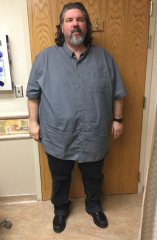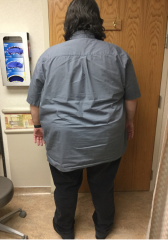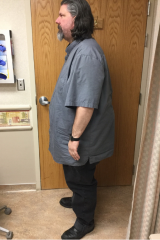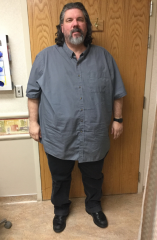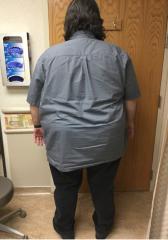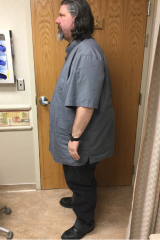Search the Community
Showing results for 'renew bariatrics'.
Found 17,501 results
-


Marginal/anastomotic ulcer anyone?
Ronnysgal replied to eudys3's topic in Gastric Bypass Surgery Forums
Sorry to hear about your sufferings. I am about 1 year and 4 months out from my Gastric Bypass and have had a horrific go of it. I have had to have multiple abdominal scans and throughout the last 6 months it has been, well devastating. You can see from the pictures below "sorry to be graphic with photos" but want people to understand this is something that can happen. It does not happen to everyone, so if you are going to have the Bypass, do not automatically assume this will happen to you. Unfortunately mine will not go away and perforation is always a possibility for me. I never had stomach ulcers pre-surgery and my Bariatric Doctor is man enough to say the surgery is the cause of the ulcers. Since I am malnourished, extremely weak all the time, and now am consistently battling these deep bleeding ulcers you see below, we are looking at doing a reversal soon. If my insurance company will pay for it as I have had to come up with well over 15, 000 out of pocket for the last few years and am unable to continue financially at this pace. I was taking Omeprazole and it was not until I stopped taking it that the ulcers became dominating, so I am unsure if it was keeping them at bay or not. I take 2 Protonix everyday as well as Carafate. I long for the day of reversal as this has not been a good experience for me. I am glad I have a good surgeon. My stomach photos I -


I’m too Freaking Small
MarinaGirl replied to stewart7's topic in General Weight Loss Surgery Discussions
Sagging skin is inevitable for most successful bariatric patients. The only way to resolve it is with plastic surgery. I’m 5’8” and weigh 125 lbs. I look good (not too thin/skeletal) but am hoping that I can get PS one of these days. I would like an arm lift and tummy tuck. For now, I’m doing lots of Bikram hot yoga to improve my posture and develop muscle tone and flexibility. OP: i can’t imagine trying to gain weight when you’re not malnourished. Your body will find its new set point. I worry that doing what you’re doing will result in bad habits and greater weight gain than you desire, resulting in worsening health and inability to maintain weight loss long term. -


Can you drink water and a protein shake
aoGabby replied to aoGabby's topic in Gastric Bypass Surgery Forums
must be different for US and Canada. I have my plan here if you want to check it out. 001481_nutrition guidelines after bariatric surgery.pdf -

"I'm having metabolic surgery next week, so I'll be taking a few days off to recoup."
ScoutCR replied to Born in Missouri's topic in General Weight Loss Surgery Discussions
I had this surgery for entirely metabolic reasons. I was also overweight but my reason for checking out the surgery was for health. I was diagnosed last May with chronic kidney disease with a GFR then of 28. I was told dialysis was 2 yrs or less away for me. I also had diabetes and high blood pressure. I had a stroke when I was 50. After my kidney diagnoses researched my options and found UPMC in Pittsburgh was promoting Bariatric surgery as a way to improve or cure all the reasons I needed the surgery. Fast forward to April 27, 2018 and I had my gastric bypass at UPMC. I just had my checkup with my kidney specialist and my GfR is now 87. He says it should improve further but he considers me technically cured of my CKD. My diabetes is in remission always in the normal ranges and my BP is normal. Thanks to this operation I have a bright future! -
According to the internet: Nausea and vomiting are the most common complaints after bariatric surgery, and they are typically associated with inappropriate diet and noncompliance with a gastroplasty diet (ie, eat undisturbed, chew meticulously, never drink with meals, and wait 2 hours before drinking after solid food is consumed). If these symptoms are associated with epigastric pain, significant dehydration, or not explained by dietary indiscretions, an alternative diagnosis must be explored. One of the most common complications causing nausea and vomiting in gastric bypass patients is anastomotic ulcers, with and without stomal stenosis. Ulceration or stenosis at the gastrojejunostomy of the gastric bypass has a reported incidence of 3% to 20%. Although no unifying explanation for the etiology of anastomotic ulcers exists, most experts agree that the pathogenesis is likely multifactorial. These ulcers are thought to be due to a combination of preserved acid secretion in the pouch, tension from the Roux limb, ischemia from the operation, nonsteroidal anti-inflammatory drug (NSAID) use, and perhaps Helicobacter pylori infection. Evidence suggests that little acid is secreted in the gastric bypass pouch; however, staple line dehiscence may lead to excessive acid bathing of the anastomosis. Treatment for both marginal ulcers and stomal ulcers should include avoidance of NSAIDs, antisecretory therapy with proton-pump inhibitors, and/or sucralfate. In addition, H pylori infection should be identified and treated, if present. So several individuals experience severe nausea after bariatric surgery. Nipping H. pylori prior to surgery, will relieve a major problem after surgery. It is a common infection. About fifty percent of the world's population has it. It is also difficult to kill. It is somewhat antibiotic resistant. I may take a couple rounds to kill it off using various cocktails of antibiotics.
-
You could also call/visit websites if local hospitals that have bariatric programs and get information from them. VSG2017 HW 249 SW 238 CW 167
-
I don’t do shakes. Every morning I have a protein juice drink. I got it from Amazon and it’s called New York bariatric. I got the sample pack which has 7 flavors. I add to it Dr Axe collagen protein. I am getting 25 g of protein I that drink. It’s just Different than a creamy shake. I prefer juice in the morning so this works well for me and it’s fewer calories than a shake.
-
From the album: Macadamia
These photos were taken by the nurse at my bariatric surgeon, Dr. Eric Volckmann's office. Yes, I have an iron deficiency (actually, an ironing board deficiency... I do own an iron.) And, I know I look like I'm packing appendix and at 7 o'clock; however, even though I have an enhanced concealed carry permit issued by the state of Idaho, I do not carry because no matter what I do, I print. I'll explain why the front looks like that soon, but in the back, my shirt is just caught on my fat hip. -
From the album: Macadamia
These photos were taken by the nurse at my bariatric surgeon, Dr. Eric Volckmann's office. Yes, I have an iron deficiency (actually, an ironing board deficiency... I do own an iron.) And, I know I look like I'm packing appendix and at 7 o'clock; however, even though I have an enhanced concealed carry permit issued by the state of Idaho, I do not carry because no matter what I do, I print. I'll explain why the front looks like that soon, but in the back, my shirt is just caught on my fat hip. -
From the album: Macadamia
These photos were taken by the nurse at my bariatric surgeon, Dr. Eric Volckmann's office. Yes, I have an iron deficiency (actually, an ironing board deficiency... I do own an iron.) And, I know I look like I'm packing appendix and at 7 o'clock; however, even though I have an enhanced concealed carry permit issued by the state of Idaho, I do not carry because no matter what I do, I print. I'll explain why the front looks like that soon, but in the back, my shirt is just caught on my fat hip. -
These photos were taken by the nurse at my bariatric surgeon, Dr. Eric Volckmann's office. Yes, I have an iron deficiency (actually, an ironing board deficiency... I do own an iron.) And, I know I look like I'm packing appendix and at 7 o'clock; however, even though I have an enhanced concealed carry permit issued by the state of Idaho, I do not carry because no matter what I do, I print. I'll explain why the front looks like that soon, but in the back, my shirt is just caught on my fat hip.
-
- pre-op
- first photos
-
(and 1 more)
Tagged with:
-
These photos were taken by the nurse at my bariatric surgeon, Dr. Eric Volckmann's office. Yes, I have an iron deficiency (actually, an ironing board deficiency... I do own an iron.) And, I know I look like I'm packing appendix and at 7 o'clock; however, even though I have an enhanced concealed carry permit issued by the state of Idaho, I do not carry because no matter what I do, I print. I'll explain why the front looks like that soon, but in the back, my shirt is just caught on my fat hip.
-
These photos were taken by the nurse at my bariatric surgeon, Dr. Eric Volckmann's office. Yes, I have an iron deficiency (actually, an ironing board deficiency... I do own an iron.) And, I know I look like I'm packing appendix and at 7 o'clock; however, even though I have an enhanced concealed carry permit issued by the state of Idaho, I do not carry because no matter what I do, I print. I'll explain why the front looks like that soon, but in the back, my shirt is just caught on my fat hip.
-
- pre-op
- first photos
-
(and 1 more)
Tagged with:
-
Hello, I am new to this forum! I started the process in may (not thinking I would actually get approved), I attended a weight loss seminar may 31st. Their were about 4 papers to fill out and return then wait to be called by the patient coordinator supervisor. I was contacted within hours of turning the paperwork in. I was told that I was approved and I needed to pick a surgeon. After picking a surgeon the ball rolled pretty quick. I was scheduled to see the surgeon the first week in June. I was a great candidate for gastric sleeve and could go forward with the process. I then was assigned a bariatric coordinator that got everything lined up for me. I had to do one nutrition appointment, get a EKG, lab work, upper gi study and a psychological evaluation . Everything was quick except the evacuation for some reason it took 3 weeks to get scheduled. I also had to reach out to them. After getting no response from the psychologist, I reached out to my coordinator hoping she would be helpful. I slowly realized I was getting on her nerves with my many phone calls and voicemails. After calling 3 times I finally got a hold of her getting a preop appointment for 7/26. I’m a little concerned that she will not do what needs to be done when submitting for approval. I am now done with everything and waiting for my insurance company to approve me. With a surgery date of 8/6 my concern is I won’t be approved in time. After preop with the surgery how long after were you approved for surgery? I’m guessing I will know Thursday if I’m going forward with my surgery date or not.
- 15 replies
-
Hello, I am also new to this forum! I started the process in may (not thinking I would actually get approved), I attended a weight loss seminar may 31st. We had about 4 papers to fill out and return them wait to be called by the patient coordinator supervisor. I was contacted within hours of turning the paperwork in. I was told that I was approved and I needed to pick a surgeon. After picking a surgeon the ball rolled pretty quick. I was a great candidate for gastric sleeve and could go forward with the process. I then was assigned a bariatric coordinator that got everything lined up for me. I had to do one nutrition appointment, get a EKG, lab work, upper gi study and a psychological evaluation . Everything was quick except the evacuation for some reason it took 3 weeks to get scheduled. I also had to reach out to them. I am now done with everything and waiting for my insurance company to approve me. I have my preop scheduled for 7/26 with an surgery date of 8/6. I’m guessing I will know Thursday if I’m going forward with my surgery date or not. Hopefully everything works out!
-
That's my whole problem my doctor is not a bariatric surgeon he is a general surgeon and I never got a real plan for anything most things that I've learned I've learned from this site and you ladies so that's why I'm asking I don't know what to eat I know it's time for a change I just got off of soft foods like yogurt and I'm ready to switch to something else but I don't know what I'm I know high-protein but I don't know what to make Sent from my SM-J327T1 using BariatricPal mobile app
-


Weight bias and people-first language
nibble replied to Born in Missouri's topic in General Weight Loss Surgery Discussions
I know, I know... what is a librarian doing with a BSW and MSW?! Go figure! I was in social work briefly, but the funds were soft and I was a single parent + 3 kids, yadda yadda.....Well, I guess we'll have to share our research adventures in bariatric surgery living. That IS my lifestyle from now on. I can't wait to explore lo-carb/hi-protein cooking and baking down the road in the Kitchen Laboratory! I can't do processed foods, so must make everything. Looks like you are about 4 weeks ahead of me -- maybe you will have some menu or cooking tips at some point. I was just reading about Banza lo carb pasta... -


How often have you gotten sick?
Born in Missouri replied to MN_Meg770's topic in Gastric Bypass Surgery Forums
I've been seriously thinking about compiling a bariatric surgery / weight-loss glossary of terms and I thought, "Oh! A new word to add." Good thing you corrected your post. I would have wasted time looking for the definition of a term that doesn't exist. -


2016 Study: Fracture risk increases with bariatric surgery
RickM replied to Born in Missouri's topic in General Weight Loss Surgery Discussions
Note that when an article refers to "bariatric surgery" or "weight loss surgery" in the general sense - not specifying any particular procedure, they are typically referring to the RNY gastric bypass, as that is, or has been, the most common procedure over the past 20-30 years (and particularly in Canada and other countries that may have been slower to adopt newer procedures). If you have a different procedure, the article may or may not apply to you. The warning may still be valid - changes in diet after surgery may result in deficiencies even of the procedure that you have doesn't have any inherent relevant malabsorption - and the advice may still be sound - keep up with labs and maintain appropriate supplements, even if they may be different from what is anticipated in the article. -


Weight bias and people-first language
Born in Missouri replied to Born in Missouri's topic in General Weight Loss Surgery Discussions
@nibble. Like you, finding out that obesity-is-now-a-disease was the impetus to find out if my insurance covered bariatric surgery. Fortunately, I didn't give up when my first phone call reached someone who mixed up my plan with another plan that did not have bariatric benefits. I became a squeaky wheel after that until I knew my benefits backwards and forwards, and if anyone tried to insert a requirement that wasn't in my plan, I let them know! One of the "requirements" that someone tried to convince me was a part of my plan had to do with not being allowed to gain any weight during the 6-month physician-directed weight-loss attempt. My plan required only that I do those six months. There was nothing in my plan that "punished" me for gaining weight during those six months. I've noticed several posters on this forum, primarily younger women, who aren't confident in being good self-advocates. Stop apologizing for everything. Stop allowing gatekeepers to keep you from getting the information you need. To make good decisions, you deserve to have all the facts. Read. Ask. Read some more. Keep asking. A librarian.. .. I considered library science for a while, but ended up getting a B.S. in health information management. Of course, that's not what I do for a living. Who else has a degree or degrees in areas that they don't work in? -


How do I eat healthy when my family doesn't?
GreenTealael replied to luckyducky's topic in General Weight Loss Surgery Discussions
I'm a firm believer that husbands wives and young children sign up for the bariatric package (some dietary changes have to occur in their lives too) everyone else like mothers, fathers, adult children, sisters, brothers, roommates, etc they can support in other ways VSG2017 HW 249 SW 238 CW 167 -


Intro time: who's new to the group, who's pre-op, & who just recently made it to the loser's bench?
Frustr8 replied to xoxococojay's topic in PRE-Operation Weight Loss Surgery Q&A
@Manpower,if you are still out there be happy for me. September 5th 2018 7 AM. E.D.T. Ohio State University Hospital- Wexner Medical Center Columbus Ohio 43210 Type Surgery RnY bypass Surgeon Bradley J Needleman - Department Head'-- Bariatric Surgery & Metabolic Weight Loss And Finally,It Will Be Happening!!! -


Weight bias and people-first language
Born in Missouri replied to Born in Missouri's topic in General Weight Loss Surgery Discussions
@nibble I am speechless. You wrote to the AMA and they wrote back to you? Wow! That's fantastic. How did it feel to pour such powerful emotions into a letter and then send it to the very people who had a role in our collective abilities to have life-changing surgery? Without that disease classification, insurance companies would not have included bariatric surgery as a covered benefit. I COULD NOT OPEN THE DOCUMENT. Boo-hoo. Thank you so much. Your idea to write that letter profoundly impressed me. -


2016 Study: Fracture risk increases with bariatric surgery
Born in Missouri posted a topic in General Weight Loss Surgery Discussions
People with severe obesity who undergo bariatric surgery have a higher risk for fracture both before and after the procedure. “To minimize the effect of bariatric surgery on bone, guidelines should be followed and the importance of adherence to supplements and physical activity should be reinforced among patients and healthcare professionals." https://www.healio.com/endocrinology/bone-mineral-metabolism/news/in-the-journals/{7e479b49-f551-4de5-a2c2-03b0718b1bdf}/fracture-risk-increases-with-bariatric-surgery IMPORTANT: Take your supplements! Vitamins! Minerals! And don't forget to excercise!- 1 reply
-
- study
- toc: topics of interest
-
(and 3 more)
Tagged with:
-


Going Alone, dying, fear - How to Overcome?
Frustr8 replied to MizzNewLife's topic in Mexico & Self-Pay Weight Loss Surgery
And as I have said if I didn't have insurance coverage and could afford private pay Dr I plan would be the surgeon I would choose. Alex Brecher, Bariatric Pal's founder chose him for his own surgery, and I call that a strong recommendation.👍😷👍






